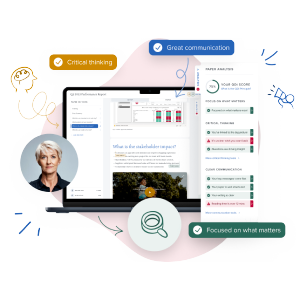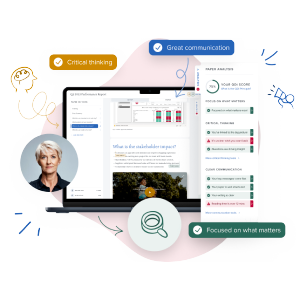Every school governor is passionate about ensuring that pupils do their very best and that their school flourishes. Yet how many school governors would, hand on heart, say their meetings are laser-focused on priorities which help achieve those aims, instead of being bogged down in the weeds of operational detail?
Here at Board Intelligence we help organisations across the private, public, and third sectors embed the discipline of focus throughout the board and leadership, turning governance into a powerful driver of both performance and purpose. But habit and convention often blur this focus at the first hurdle — getting the organisation’s priorities right. We also know from research that barely one-third of boards operate with clear priorities in mind at all.
It’s impossible to drive performance and purpose without clear priorities. So let’s look at the cause of this failure, and how it can be avoided
What’s the cause?
The UK’s Independent Schools offer academic, pastoral, and reputational excellence. Those aims have and should remain unchanged. However, as with board meetings in the corporate world, governors’ meetings have also remain unchanged, driven by habit and convention.
Rather than starting from scratch each time a meeting or meeting cycle is planned, too many boards copy and paste the last meeting’s agenda — thus entrenching past mistakes.
“We would use our time better if we abandoned the ‘high church’ rituals. Wasting the first half an hour reviewing minutes and matters arising does little to set the scene for a rich debate.”
~ Sir Kenneth Olisa OBE, CStJ, FRSA, FBCS, Lord-Lieutenant of Greater London
The breadth and complexity of topics governors must now consider has expanded, but agendas haven’t. Fast moving political, demographic, economic and social issues such as charitable status, Brexit and public health have raised their heads recently. But boards struggle to keep up.
Does your governors’ meeting agenda cover these developments? Or does it start with “Apologies” and a debate over last month’s minutes?
Everyone knows there has been an increase in compliance and regulation on agendas, but research shows meeting time has remained the same.
So what’s being squeezed out? Debate. Challenge. Strategy.
Boards spend two-thirds of their time on supervisory discussions. But is this what governors want to do? Is this where they can add value?
When we ask any board member why they joined a board, they tell us it was because of the opportunity to guide the organisation’s strategy and create real change.
School governors don’t want to spend time looking backwards, monitoring, and seeking assurance from management. They want to ensure their school remains a beacon of learning and opportunity when they’re long gone.
What can be done?
A few things will make a huge difference:
- Break with the habit and convention of your agenda structure, and don’t fall into the trap of copying and pasting a prior meeting.
Start with your school’s real priorities (e.g. academic excellence, pupil and staff happiness, growth) — these items should be tackled at the start of meetings, when the board is fresh and time is plentiful.
Relegate the regular and routine items to their rightful place — after the important stuff. - How you want to use your time should be governed first by your mandate and mission.
Think of your meeting agenda like a jar. First you need to put in the large “rocks” — the important steering priorities, significant decisions, and scheduled supervisory deep dives. Get them in the jar first, otherwise they won’t fit.
Then comes the “sand” — which previously dominated the agenda. It’s the regular and routine items: monthly or quarterly performance reports and compliance and regulatory items, for example. Pour them in after.
Finally, you’ll have room for a few “pebbles” — papers in response to things that crop up over the course of the year that you can’t plan for.
Simple? Yes. But when applied to your agenda it can transform your meetings. - Be ruthless about that which comes first and that which isn’t important.
The key to focusing your meeting on what really matters is to prioritise and plan; take time to make time. This will benefit the governors and will make management’s life much easier in turn.
Planning agendas across an interconnected lattice of committees, management forums, and governors’ meetings can be a mammoth task. Consumed by administration and juggling Word and Excel documents with constant updates and new versions, there is little or no time for the planners to advise the governors on whether the content of the agenda really is focused on the right priorities and strategic items.
That balance can be re-struck through more thoughtful planning and the use of smart tools to embed best practice.
What help is available?
At Board Intelligence, we help leaders drive the best possible outcomes for their organisations and wider society. Our platform lets them concentrate time on what’s important and make sure it aligns to their purpose, goals, and underlying business drivers.
We’ll be introducing a host of new, priorities-related features this year, starting with Priorities Planner — learn more about it here.





